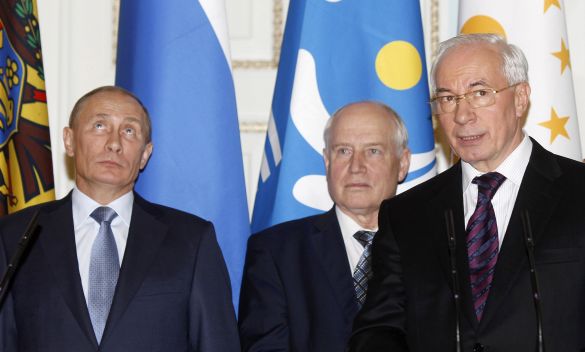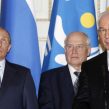
Ukraine Completes Free Trade Talks With Both the EU and CIS
Publication: Eurasia Daily Monitor Volume: 8 Issue: 202
By:

Ukraine has signed a free trade agreement with the CIS and completed its free trade talks with the EU. Unlike membership of the Customs Union (Russia, Belarus and Kazakhstan), which Moscow keeps inviting Kyiv to join, the CIS free trade accord does not formally hinder Kyiv’s official EU integration strategy. At the same time, Russia could use the accord as a means to draw Ukraine closer to its sphere of influence. Although the free trade accord prepared with the EU is more comprehensive than the CIS agreement, it is not clear when it will be signed because it is part of a broader association agreement, talks on which have been complicated by the imprisonment of former Prime Minister Yulia Tymoshenko (see EDM, October 5). This leaves an opportunity for Moscow.
On October 18, Ukrainian Prime Minister Mykola Azarov signed a CIS free trade accord along with representatives of Russia, Belarus, Kazakhstan, Armenia, Tajikistan, Moldova and Kyrgyzstan. Azarov said he hoped the accord, unlike the 1994 still-born CIS free trade accord, would come into effect in 2012. Ukraine has long insisted on free trade with the CIS but the accord was signed on Russian conditions. Oil, gas, sugar and alcohol – the goods free trade in which would have benefited Ukraine – will be exempt from the agreement. Nevertheless, the agreement favors Ukrainian metals, confectionery and machines, which are among the country’s main export items. Azarov estimated that the accord, when it comes into effect, would add some 2 percent to Ukraine’s annual GDP growth (www.liga.net, Segodnya, October 20).
Ukraine’s opposition has rejected the accord, arguing that it was signed on Russian conditions and that it could slow its integration with the EU. However, Azarov insisted that the CIS free trade accord would in no way affect Kyiv’s free trade talks with the EU and he noted that it did not oblige Ukraine to join the Customs Union (Ukrainska Pravda, October 21). Yanukovych also stressed that the CIS accord “in no way implies any hindrance in matters of Ukraine’s European integration” (UNIAN, October 23). European Commission trade spokesman John Clancy said the commission did not see how the accord could affect Ukraine’s relations with the EU (UNIAN, October 19). However, Deputy Prime Minister Serhy Tyhypko admitted in an interview with Ekho Moskvy on October 28 that the CIS free trade accord brought Ukraine closer to the Customs Union.
A breakthrough in the trade talks with the EU was reached almost simultaneously. On October 20, Ukrainian First Deputy Prime Minister Andry Klyuyev and European Commission trade commissioner Karel De Gucht announced that they reached agreement on all parameters of an EU-Ukraine free trade deal. This should facilitate the completion of the technical talks on an association deal comprising the free trade agreement by the end of 2011, according to De Gucht. He added that everything will now depend on the political resolve to complete the association talks (UNIAN, October 20).
The problem with the Ukraine-EU free trade talks is that they are part of the wider association talks so there can be no free trade without an association agreement. However, there are signs that Ukraine and the EU will not even initial the association agreement this year. First, the October 25 round of the association talks, which had been widely expected to be the last round before the association agreement signing in December 2011, was a failure. EU external action service director Miroslav Lajcak said another round of talks would be needed. Ukraine has insisted that the agreement should mention the possibility of EU membership in the future. Lajcak said this was one of the main stumbling blocks. Lajcak also said Ukraine should speed up the reforms of justice and public administration (Kommersant-Ukraine, October 27).
Moreover, Kyiv’s failure to admit that Tymoshenko’s imprisonment was a mistake and President Viktor Yanukovych’s reluctance to correct it prompted the EU to focus its attention on the situation with criminal justice in Ukraine and the broader issue of democracy. On October 25, the European Parliament adopted an unusually harsh resolution on Ukraine, saying that although it welcomed the conclusion of the free trade talks, a failure to review Tymoshenko’s conviction would jeopardize the conclusion of the association agreement. The European Parliament also expressed alarm over the situation with media freedom and urged Ukraine to adhere to the OSCE and Venice Commission’s recommendations on the electoral legislation. The authorities have drafted a new election bill, which provides for replacing the current proportional with a mixed system of elections, but the European bodies urged a revision of the bill as the new system is likely to make it very easy for the ruling party to win the parliamentary election next year.
Kyiv has pretended that nothing has happened. Yanukovych said he would continue to insist that the association and free trade agreement to be signed with the EU in December should mention the possibility of full membership of the EU in the future (UT1, October 19). He dismissed the European Parliament’s resolution as emotional, and in a recent telegram to EU President Herman Van Rompuy, he said the association talks should be completed successfully at the Ukraine-EU summit scheduled for December 19 (www.president.gov.ua, October 28; Ukrainska Pravda, October 31).




